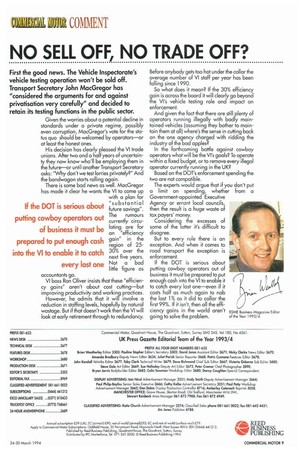NO SELL OFF, NO TRADE OFF?
Page 13

If you've noticed an error in this article please click here to report it so we can fix it.
First the good news. The Vehicle Inspectorate's vehicle testing operation won't be sold off. Transport Secretary John MacGregor has "considered the arguments for and against privatisation very carefully" and decided to retain its testing functions in the public sector.
Given the worries about a potential decline in standards under a private regime, possibly even corruption, MacGregor's vote for the status quo should be welcomed by operators—or at least the honest ones.
His decision has clearly pleased the VI trade unions. After two and a half years of uncertainty they now know who'll be employing them in the future—or until another Transport Secretary asks: 'Why don't we test lorries privately?" And the bandwagon starts rolling again. There is some bad news as well. MacGregor has made it clear he wants the VI to come up with a plan for "substantial future savings".
The rumours currently circulating are for an "efficiency gain" in the region of 2530% over the next five years. Not a bad little figure as accountants go. VI boss Ron Oliver insists that these "efficiency gains" aren't about cost cutting—but improving productivity and working practices. However, he admits that it will involve a reduction in staffing levels, hopefully by natural wastage. But if that doesn't work then the VI will look at early retirement through to redundancy. Before anybody gets too hot under the collar the average number of VI staff per year has been falling since 1990. So what does it mean? If the 30% efficiency gain is across the board it will clearly go beyond the VI's vehicle testing role and impact on enforcement.
And given the fact that there are still plenty of operators running illegally with badly maintained vehicles (assuming they bother to maintain them at all) where's the sense in cutting back on the one agency charged with ridding the industry of the load apples? In the forthcoming battle against cowboy operators what will be the VI's goals? To operate within a fixed budget, or to remove every illegal operator currently running in the UK? Based on the DOT's enforcement spending the Iwo are not compatible.
Considering the excesses of some of the latter it's difficult to disagree. But to every rule there is an exception. And when it comes to road transport the exception is enforcement.
If the DOT is serious about putting cowboy operators out of business it must be prepared to put enough cash into the VI to enable it to catch every last one—even if it costs half as much again to nab the last 1% as it did to collar the first 99%. If it isn't, then all the efficiency gains in the world aren't going to solve the problem.
































































































